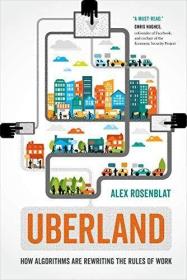
现货Uberland: How Algorithms Are Rewriting the Rules of Work[9780520298576]
¥ 228 九五品
仅1件
上海宝山
认证卖家担保交易快速发货售后保障
作者Rosenblat, Alex
出版社University of California Press
ISBN9780520298576
出版时间2018-10
装帧精装
纸张其他
页数292页
正文语种英语
上书时间2023-09-22
- 最新上架
商品详情
- 品相描述:九五品
- 商品描述
- A silent cultural revolution is reshaping how we will work for generations to come-and its being led by Uber. The once small Silicon Valley start up has become a juggernaut of the sharing economy, luring drivers with the promise of becoming entrepreneurs but treating them like consumers-and upending labor laws and society expectations simultaneously. Technology ethnographer Alex Rosenblat shares her award-winning research on how algorithmic managers shape how drivers behave, treating them as consumers rather than employees. With the help of this technology, Uber claims to operate in a world of consumption rather than labor, skirting a series of obligations and laws, manipulating wages, and misleading the public. By using algorithms and rhetoric to blur the line between workers and consumer, Uber exemplifies the ways in which technology can rewrite rules of law and society. Based on Rosenblat's first hand experience of riding 5,000 miles with Uber drivers, daily visits to online forums from 2014-2018, and face-to-face discussions with Uber senior executives, Uberland goes beyond the question of labor history and law by highlighting how Uber changes various aspects of our lives, be it family life or childcare arrangements, worker conditions or management practices, commuting patterns or urban planning, or racial equality campaigns and labor rights initiatives. With a critical eye towards unveiling the truth, Uberland provides a rare window into the profound social and cultural shifts taking place in a society mediated by technology.
— 没有更多了 —
![现货Uberland: How Algorithms Are Rewriting the Rules of Work[9780520298576]](https://www0.kfzimg.com/sw/kfz-cos/kfzimg/17733071/fb2a28d86d4f92fc_b.jpg)

![现货Materials and Technologies of Modern Production[9783036401683]](https://www0.kfzimg.com/sw/kfz-cos/kfzimg/17733071/5fd2824531e165d7_s.jpg)
![现货Introduction to Container Ship Operations and Onboard Safety[9781032155425]](https://www0.kfzimg.com/sw/kfz-cos/kfzimg/17733071/58b7ff43ef7909ee_s.jpg)
![现货Electrophosphorescent Materials and Devices[9789814877343]](https://www0.kfzimg.com/sw/kfz-cos/kfzimg/17733071/18cc1d77bcb7b488_s.jpg)
![现货Organic Semiconductors for Optoelectronics[9781119146100]](https://www0.kfzimg.com/sw/kfz-cos/kfzimg/17733071/24c85a750c708964_s.jpg)
![现货Advances in Food Rheology and Its Applications[9780081004319]](https://www0.kfzimg.com/sw/kfz-cos/kfzimg/17733071/e0c11603c9119d4d_s.jpg)
![现货Advanced Materials and Sustainable Technologies[9783035727562]](https://www0.kfzimg.com/sw/kfz-cos/kfzimg/17733071/dced675333874c48_s.jpg)
![现货Advanced Materials and Manufacturing Engineering II[9783035712681]](https://www0.kfzimg.com/sw/kfz-cos/kfzimg/17733071/660ccfae75fa8d3e_s.jpg)
![现货Materials in Machinery and Construction[9783035718119]](https://www0.kfzimg.com/sw/kfz-cos/kfzimg/17733071/6f402060775e9daa_s.jpg)
![现货Cereal Grain Quality (Softcover Reprint of the Original 1st 1996)[9789401071772]](https://www0.kfzimg.com/sw/kfz-cos/kfzimg/17733071/f93ca1c96a97403a_s.jpg)
![现货Uberland: How Algorithms Are Rewriting the Rules of Work[9780520298576]](/dist/img/error.jpg)
以下为对购买帮助不大的评价